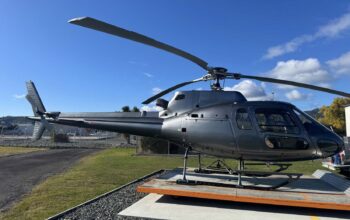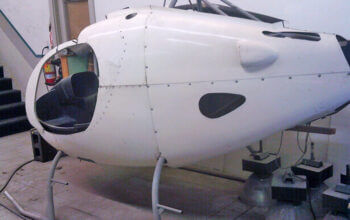A new class of soft solid electrolytes made from both polymers and ceramics could enable high-performance lithium-metal batteries for eVTOL applications, according to researchers from Lawrence Berkeley National Laboratory (Berkeley Lab) and Carnegie Mellon University.

In a paper published recently in the journal Nature Materials, the researchers describe a lithium-electrode sub-assembly (LESA) technology that could suppress the formation of lithium dendrites — tiny, treelike structures created during electrodeposition while charging lithium metal batteries. Dendrites limit a battery’s useful life and can create safety hazards including short-circuiting and thermal runaway.
Historically, hard solid electrolytes — such as those made from ceramics — have been used in lithium-metal batteries in an attempt to limit dendrites’ spread. According to Berkeley Lab, however, that approach didn’t stop dendrites from forming in the first place.
The new electrolyte design uses soft polymers of intrinsic microporosity (PIMs), the pores of which are filled with nanosized ceramic particles. Researchers demonstrated its dendrite-suppressing features by using X-rays at Berkeley Lab’s Advanced Light Source in California to create 3D images of the interface between lithium metal and the electrolyte, visualizing lithium plating and stripping for up to 16 hours at high current.
As reported in Nature Materials, the researchers observed “starkly contrasting behavior” between their LESA technology and control samples. Cells with the new PIM composite electrolyte showed no observable change in lithium density throughout the plating experiment, while the control cells exhibited signs of the early stages of dendritic growth within hours.
By slowing the onset of low-density lithium deposits, the researchers wrote, the LESA should “prolong the life cycle of lithium metal batteries by slowing electrolyte degradation and mitigating density-driven instabilities that would otherwise lead to dendrite formation and cell shorting.”

According to Brett Helms, a staff scientist in Berkeley Lab’s Molecular Foundry and a co-author of the Nature Materials paper, this dendrite-suppressing technology has “exciting implications” for the battery industry in general and for eVTOL aircraft in particular.
“For eVTOL, energy and power are of paramount importance,” Helms told eVTOL.com by email. “Our [LESA] technology addresses both of those. Lithium metal batteries with high-voltage cathodes provide the energy density needed for eVTOL to carry cargo. Additionally, the performance of the LESA enables high power, needed for both lift-off and landing.”
The battery manufacturer 24M Technologies is working with Berkeley Lab under an Advanced Research Projects Agency-Energy (ARPA-E) contract to assemble and test large-format lithium metal cells using the lab’s LESA technology. Such large-format cells could be used to power ground-based electric vehicles as well as eVTOLs.
Helms said that the research team will now be focusing on component and cell manufacturing at scale. Because the electrolyte remains flexible, battery manufacturers should be able to manufacture rolls of lithium foils with the electrolyte as a laminate between the anode and the battery separator.
Companies that are potentially interested in licensing the technology should contact the Intellectual Property Office at Berkeley Lab.








